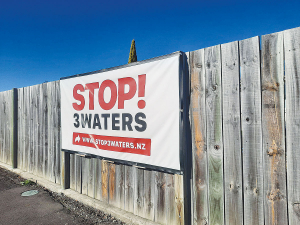OPINION: Farmers have delivered a message to the Government – time to push the pause button on Three Waters Reforms and have a rethink.
The Government has put forward legislation for New Zealand’s three water services – drinking water, wastewater and stormwater – to be managed by four new publicly-owned water entities (WSEs), replacing the services currently managed by 67 councils. But the Government is having a hard time convincing ratepayers that this is the best way forward. Despite pouring millions into advertising and marketing their plan, the Government has made very little headway, even with community leaders.
A majority of city and regional councils also remain adamant that Three Waters isn’t the way forward.
Recently Federated Farmers presented its submission to a parliamentary select committee. Farmers agree that reforms are needed, but not in the form of Three Waters.
The Government’s justification for WSEs is that the state of water infrastructure is poor and too many councils have failed to adequately maintain and improve it, which is affecting health and environmental outcomes, among others.
As a result of the pressures to better maintain and improve three waters infrastructure, a huge investment will be required, with the Government estimating $120 billion to $185 billion over the next 30 years.
Farmers note that the Government argues that under current service arrangements this would flow to huge increases in water costs to consumers, with costs of water services without reform ranging from $1,900 to $9,000 per year within 30 years, depending on the council.
Few disagree that there are problems and there is a strong case for change. But they point out that the debate has more been about what is the best solution.
The Government’s four entity ‘mega model’ is about ‘transformational change’. It sees alternatives like voluntary change and collaboration between councils and/or a national three waters fund as “too piecemeal” and unlikely to solve the root causes of the problems. Farmers note that the Government is promising much lower water costs from its reforms ($800 to $1,640 depending on the council). However, what is not clear is whether the benefits will be as large or the costs as low as claimed.
The Three Waters Reform is flawed; the degree of investment claimed to be needed is considerably overstated and the supposed cost savings under the proposal are highly implausible. Critically, ownership and accountability will be taken away from the communities who actually own the assets. It’s time for the Government to rethink the proposal.


















